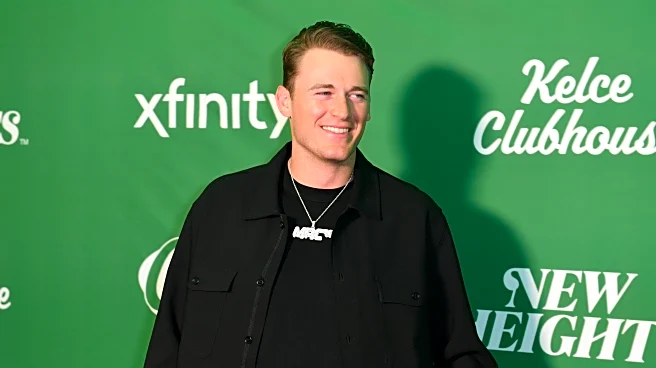What is the story about?
What's Happening?
Mona Fastvold's film 'The Testament of Ann Lee' premiered at the Venice Film Festival, showcasing the story of Ann Lee, the founding leader of the Shakers. The film, co-written and produced by Fastvold's husband Brady Corbet, was shot on a $10 million budget using 35mm film, later expanded to 70mm for a grand visual effect. The production involved shooting on location in Hungary and aboard an 18th-century ship in Sweden. The film features Amanda Seyfried as Ann Lee, with a supporting cast including Christopher Abbott and Lewis Pullman. The narrative follows Lee's journey from Manchester, England, to colonial America, emphasizing themes of social equality and utopian ideals. The film's music, composed by Daniel Blumberg, incorporates actual Shaker hymns, and the costumes were handcrafted by Malgorzata Karpiuk.
Why It's Important?
The film's significance lies in its portrayal of a historical female figure on a grand scale, a rarity in cinema. Fastvold's approach challenges the male-dominated narrative landscape by focusing on Ann Lee's leadership and vision for a society based on equality and empathy. This project highlights the potential for diverse storytelling in the film industry, offering a platform for underrepresented historical narratives. The film's production also underscores the importance of creative freedom in filmmaking, as Fastvold was given final cut rights, allowing her to fully realize her artistic vision. This could inspire more filmmakers to pursue ambitious projects that challenge traditional storytelling norms.
What's Next?
Following its Venice premiere, 'The Testament of Ann Lee' is positioned as a significant acquisition title, likely to attract interest from distributors seeking unique and impactful films. The film's reception at the festival could influence its journey through the awards circuit, potentially mirroring the success of Corbet's previous work, 'The Brutalist.' The film's themes of equality and empathy may resonate with contemporary audiences, sparking discussions on historical and social issues. As the film gains visibility, it may also encourage further exploration of female-led narratives in cinema.
Beyond the Headlines
The film's exploration of Ann Lee's utopian vision offers a reflection on modern societal values, particularly in terms of gender equality and community building. Fastvold's emphasis on creating a nurturing and empathetic environment on set mirrors the film's themes, suggesting a shift towards more inclusive and supportive filmmaking practices. This approach could influence industry standards, promoting a culture of collaboration and respect in film production.















